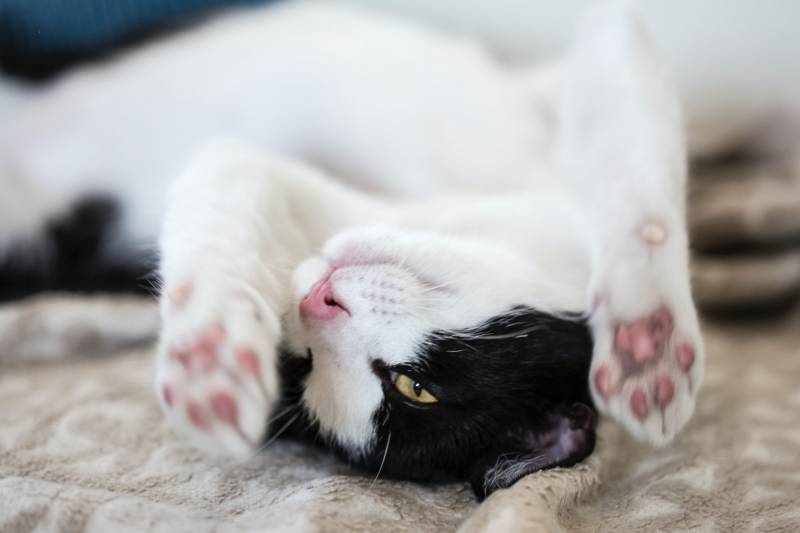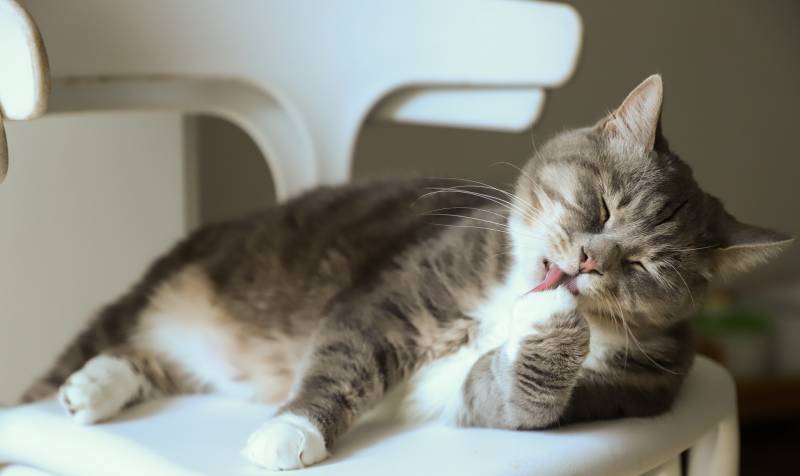Quick Navigation
Cat paws are an integral part of their body, so if a cat paw pad is peeling, you need to know why.
Your cat uses its paws to walk, run, jump, climb, scratch, groom, and even sleep.
Cats’ paws are also used to communicate with other animals and provide traction while walking.

However, cat paws are prone to various health problems, such as peeling off and the cause of this is unknown.
However, several factors contribute to it.
This article will discuss the possible causes of your cat’s paw pads peeling off and how to prevent them.
Cause Why Your Cat’s Paw Pad Is Peeling
1. Over-grooming
It can be caused by excessive licking or scratching.
If your cat licks its paws excessively, it is probably trying to remove excess oils from its paws.
Excessive licking leads to dry skin.
Dry skin makes the fur brittle and weak too.
You must stop the behavior immediately when you notice any signs of overgrooming, like redness around the nails, bald patches under the nail beds, and cracks between the toes.
Ensure that your pet gets enough water intake as well as proper nutrition.
2. Poor Nutrition
A poor diet can lead to unhealthy hair follicles.
Hair follicle infections can result in cracked heels and toe pads.
Your cat needs good quality food rich in protein and vitamins for healthy hair growth.
Make sure that your cat eats fresh foods daily.
Also, ensure they have access to clean drinking water throughout the year.
3. Protein Deficiency
Your cat may be protein deficient that’s why it has dry and peeling off paw pads.
A high-protein diet ensures your cat gets balanced nutrition, healthy skin, and a good coat.
4. Stressful Environment
An environment full of stress can affect your cat’s immune system.
Because of stress, its immune system becomes weaker, leading to weakened claws and sore paws.
To avoid stressful situations, avoid letting your cat out during peak hours.
Try to keep him indoors until late evening to keep him from getting stressed due to the lack of sunlight.
5. Genetics
Some breeds of cats tend to develop paw pad peeling faster than others.
In some cases, genetic predisposition plays a role in paw pad peeling.
So, if you see your cat’s paw pad peeling, check whether he belongs to a breed known to suffer from this issue.
6. Medications
Certain medications can cause paw pads to peel off.
Be careful about giving your cat certain types of medication, especially those containing steroids.
Steroids increase blood flow to the area resulting in increased sweating and friction between your cat’s footpad and the ground.
Over time, it results in painful cracking of the feet.
7. Trauma
Cats’ paw pads can peel off due to an injury.
After getting injured, your cat’s body releases histamines into the bloodstream.
Histamine triggers itching and inflammation.
These symptoms often appear on the affected areas, such as the claws.
8. Infections And Skin Diseases
Some bacterial infections can trigger your cat’s paw pad to peel off.
Bacterial infection can spread throughout the entire body, including the paws.
The most common bacteria responsible are staphylococcus aureus and streptococcus pyogenes.
Both of them produce toxins that irritate the skin.
They also create pus pockets where dead cells accumulate.
Pus is usually yellowish-green in color.
It contains white flakes of dead tissue.
Also, cats paw pad peeling off can sometimes be associated with various skin disorders.
One of the most common ones is dermatitis.
Dermatitis occurs when there is excessive dryness or irritation of the outer layer of the skin.
Dry skin cracks easily, leaving it vulnerable to damage by external factors like cold weather.
If left untreated, dermatitis may progress to other forms of skin problems.

Remedies For Cat Paw Pad Peeling Off
Here are some remedies to keep your cat paw pad from peeling off:
Keep Them Hydrated
Keeping your cat hydrated helps prevent dehydration which causes its paw pad to peel off.
You should give your pet at least 2 liters of warm water daily.
Do not force-feed your cat with water.
Instead, offer small amounts frequently.
Use Natural Treatments
There are natural remedies available for treating paw pad peeling.
Some of them include the following:
Aloe Vera Gel
Aloe vera gel is used to treat wounds.
Its soothing properties make it ideal for use on irritated paws.
Apply aloe vera gel to the swollen paw pad using cotton balls soaked in aloe vera juice.
Leave it overnight before rinsing it off in the morning.
Repeat this process once daily.
Apple Cider Vinegar
Apple cider vinegar works well against paw pad peeling.
Mix 1/4 cup apple cider vinegar with 3 cups hot water.
Dip a clean towel in the solution and apply it to the affected area.
Let it soak for 10 minutes, then rinse thoroughly.
Repeat twice per week until the problem goes away.
Castor Oil
Castor oil is another effective remedy for paw pad peeling.
Rub castor oil gently over the affected area several times a day.
Make sure to avoid applying too much pressure while massaging the affected area.
Epsom Salt Bath
Epsom salt bath is an excellent way to get rid of paw pad peeling off naturally.
Add 4 tablespoons of Epson salt to a tub filled with lukewarm water.
Soak your cat’s paws in the mixture for 20 minutes.
Then, rinse thoroughly afterward.
Repeat this procedure three times weekly.
Olive Oil Massage
Olive oil massage is very beneficial for cats suffering from paw pad peeling.
Warm up some olive oil and rub it into your cat’s paw pad.
This will help relieve pain caused by inflammation.
Tea Tree Oil
Tea tree oil is an excellent treatment option for paw pad peeling if you don’t have any allergies to tea trees.
Mix equal amounts of tea tree oil and coconut oil and then dip a soft towel in the mixture and place it on your cat’s swollen paw pad.
Allow it to remain there for 15 minutes before washing it off.
Repeat this procedure two times per week.
Vaseline
Apply Vaseline to your cat’s paw pad 2-4 times weekly.
Vaseline is safe when massaged to the cats’ paws, even if the cats lick them off.
Fish Oil
Rub some fish oil into the dry paw pad after cleaning.
It is also an excellent way to introduce fish into your feline’s diet.
Cat Booties
Ensure that cat booties protect your cat’s paws from hot, cold, or rough surfaces.
Cats with access outdoors tend to be more prone to dry and chapped.
So, give your cat booties (or custom-made ones) that can easily fit an average-sized cat.
Still, you may also need some customized kitty bootie made for your cat.
You may also opt to keep your cat indoors, where she’ll be less likely to become injured or encounter extremely hot or cold surfaces or dangerous chemicals.
Protein Supplements
It would be best to feed your feline with protein-rich cat foods but stay away from low-quality cat foods containing preservatives and fillers.
Get Professional Help
If none of these treatments work, contact your vet immediately.
Your veterinarian might recommend additional medications, such as antibiotics, if necessary.
In addition, they could suggest professional grooming services to remove hairballs and mats from around your cat’s mouth.
Should I Keep My Cat Indoors From Now On?
If you want to keep your cat’s paw pad from peeling, keeping them indoors would seem to be the best solution.
However, you must also think about their well-being, and allowing them to explore the great outdoors would help them live out their best life.
Perhaps, allowing them outside could be done in moderation.
And in these moments, your supervision would also keep them from exploring places that might contribute to their paw pad peeling.
You can also let them wear cat shoes when going outside to keep their cat paws from being exposed to the elements.
But you can’t force them to if they don’t like wearing one.
They will only find all the means to remove them and set themselves free from those cat shoes.
When keeping them inside your house, especially during winter, ensure that your place has enough humidity in the cold months to keep your cat’s paw pad from peeling.
Final Thought
Dry and paws pad peeling off is common for cats who spend time outdoors.
Happily, many cats recover with effective treatment options.
You should also consult your vet to thoroughly assess your cat’s condition.

A passionate content creator on pet behavior, nutrition choices, and health, Mike is an experienced pet expert. He has been writing on multiple websites to compensate for his passion for cats. Mike grieves around plenty of pets in his parents’ house. At the start of his career, he had a sturdy intention to be a part of pet care by any means.
With his affiliation to Purrfect n’ Pawesome, he found a way to satiate his craving to participate in pet health, wellness, and behavior analysis. He has been a significant part of our team and a major contributor in equipping our site with useful, authentic, and research-backed articles.
“I love pets as much as I love to travel to explore multiple places and lifestyles. I have been attached to this pawsome platform for many years, and my experience regarding pets has enhanced significantly by using various devices to write articles. I believe in writing my thoughts and experiences, so I try to write down the experience and learnings for my readers no matter where I am and what my mood is.”
